
The following poster outlines the 5 big elements that should be included in every math class.
- Subject:
- Math
- Material Type:
- Diagram/Illustration
- Date Added:
- 02/07/2020
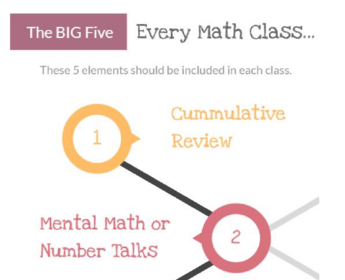
This collection features information about The Big 5 elements of a Math Class. For more information refer to the professional resource found here: https://resourcebank.ca/authoring/3212-math-at-sun-west-professional-learning-day-1
The Big 5 include:
Please note there are collections for each of The Big 5 in the hub as well. (Idea #3 & #4 are combined in the Outcome Based Math Resource Collection)

The following poster outlines the 5 big elements that should be included in every math class.
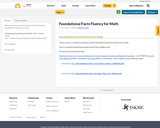
These resources can help you develop a plan for teaching foundational or basic facts in math.

This document produced by Good Spirit School Division outlines the gradual release of responsibility model as it relates to math instruction.

The following graphic was developed by a group of PeBL Mentor teachers. This graphic examines the implementation of Outcome Based Math in a Classroom.

Examine the chart entitled "High Impact Approaches at Each Phase of Learning" in Visible Learning for Mathematics (Hattie).
Use this graphic organizer from Freeology to organize the strategies you would like to use in your classroom for Surface, Deep & Transfer Learning.
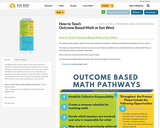
The following info-graphic spells out the steps required to establish a solid outcome based math program at your school!
The steps are given, but the resources you use are up to what is available at your individual school, as well as what fits your teaching style and your students' needs best.
Many resources can also be find in the resource bank!
Join the Outcome Based Math Group for more ideas and support in your journey!

This site uses American standards, so filter by SKILL, not grade to find what you need.
This site allows you to differentiate for a wide variety of needs quickly!
Create activities for PAPER or ONLINE learning. This can be used in the classroom and for distance learning.
*daily review creator!
*create mixed or spiral reviews to foster mastery
*create practice pages to reinforce skills
*print cheat sheets to explain skills to students
*create flashcards for review
*create modified versions of activities
*create quizzes
*multiple languages available
*drills
*make your own spelling lists using word families or use pre-made lists

Thinking of students on different pathways to learning can help us better understand Personalized Learning.
Implementing learning pathways can help teachers to "adapt to each student’s learning progress, motivation and goals".
In the example given (and there are many more versions you could use!) Students are on 3 pathways. All pathways get small group instruction!
Pathway 1 - these are the students that are usually ahead. They skip over some things and get into the deeper work.
Pathway 2 - the "core" track for students working at level.
Pathway 3 - these students may have gaps or work more slowly. They don't get MORE work, but work at their level. They will likely get more small group instruction than the other paths.
Formative assessment is used on all pathways to improve instruction and learning.
*students can move between pathways if desired or necessary!
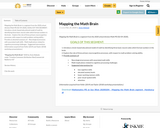
Mapping the Math Brain is a segment from the 2020 school division Math PD (02-04-2020),
GOALS OF THIS SEGMENT:
- Introduce a brain-based educational model of math by identifying three basic neural codes which format numbers in the brain.
- Explore the role of three primary neurocognitive processes, with respect to math problem-solving ability.
- Provide an attached summary of:
- Neurological processes with associated math skills
- Math implications related to cognitive processing challenges
- Suggested interventions
(Information acquired from Feifer (2019) and Taylor (2018) workshop presentations.)
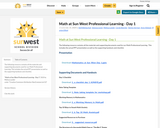
The following resource contains all the materials and supporting documents used for our Math Professional Learning. This includes the actual PPT presentation as well as the supporting handouts and checklist.
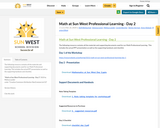
The following resource contains all the materials and supporting documents used for our Math Professional Learning. This includes the actual PPT presentation as well as the supporting handouts and checklist.

This handout provides teachers with a starting list of resources to implement The Big 5, and leaves room for them to add their favourites.

This site houses printables for teaching using Hattie's methods for Mathematics.
Templates, rubrics, prompts, checklists and more are provided!
The menu on the left side also links to several very valuable videos about teaching math using surface, deep and transfer strategies.
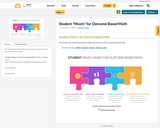
This poster lists and describes what students must have to do outcome based math well.

These three resources are strongly suggested to assist schools or classrooms when implementing The Big 5 structure of a math class.
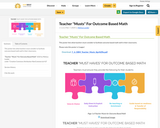
This poster lists what teachers must consider to facilitate outcome based math well in their classrooms.

"The Visible LearningTM research base is the culmination of his quest over the past 25 years to answer this question and represents more than 1,600 meta-analyses comprising more than 96,000 studies involving more than 300 million students around the world.
Through the Visible LearningTM research, John Hattie has identified more than 250 factors that influence student achievement. He then set about calculating a score or “effect size” for each, according to its bearing on student achievement. The average effect size of these 250 factors was 0.4, a marker that can be shown to represents an (average) year’s growth per year of schooling for a student. Any factor that has an effect size above 0.4 has an even greater positive effect on student learning.
Each of these factors have been categorized into one of nine domains
StudentFactors relating to background, beliefs, and physical influences
Home Factors relating to family resources, structure, and environment
School Factors related to school-type, pre-school, school composition, and leadership
Classroom Factors related to class composition, giftedness, and classroom influences
Teacher Factors relating to teacher attributes, teacher-student interactions, and teacher education
Curricula Factors related to various curricula programs
Student Learning Strategies Factors relating to self-regulation, student perspectives, and learning strategies
Teaching Strategies Factors relating to learning intentions, success criteria, feedback, and teaching strategies
Technology, School, and Out-Of-School StrategiesFactors relating to technology, school-wide methods, and out of school learning"

This excellent video about Math Anxiety examines a variety of topics including: the cause of math anxiety, the impact it has working memory and learning, and how we can try to reduce this anxiety.
This video was watched as part of Sun West's "Math the Big Picture" PD, as part of "The Big 5". This is important to consider when setting the stage for learning.
Teachers completed an activity where they created a "Top 10 Ways to Squash Math Anxiety" list. You can find this handout in the PD resource by copying and pasting this web address into a browser. https://resourcebank.ca/authoring/3212-math-at-sun-west-professional-learning-day-1
If you watch this video on your own there are questions on the right to help you think, dig deeper and discuss what you see!